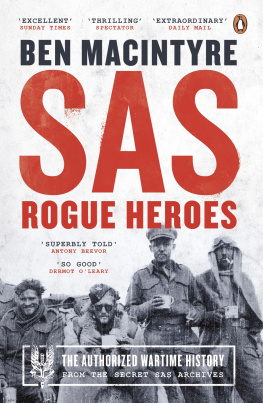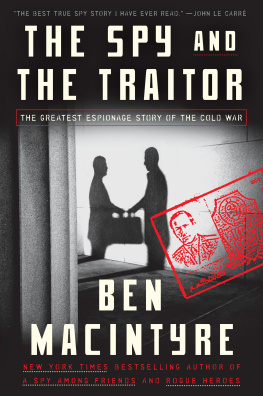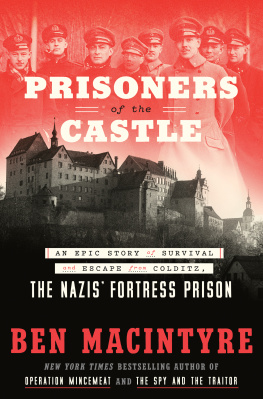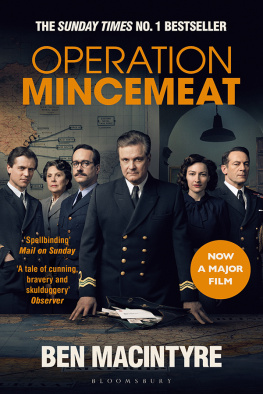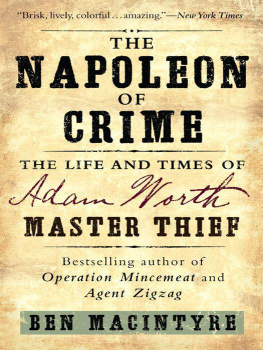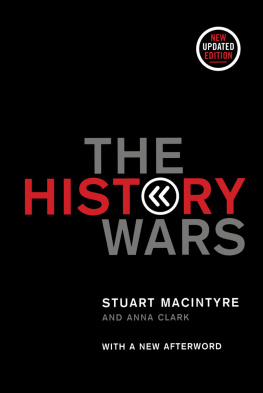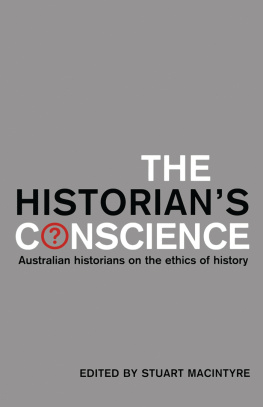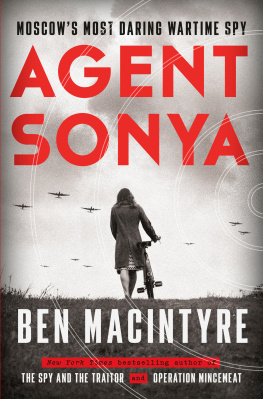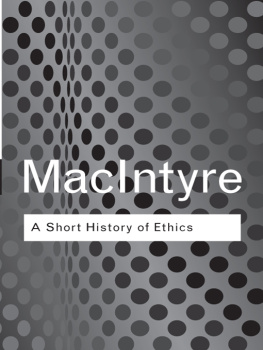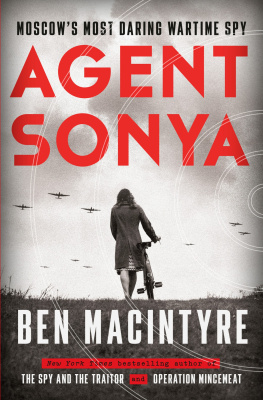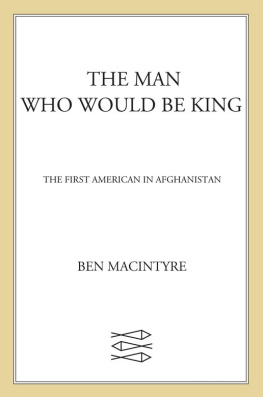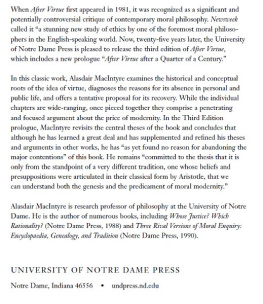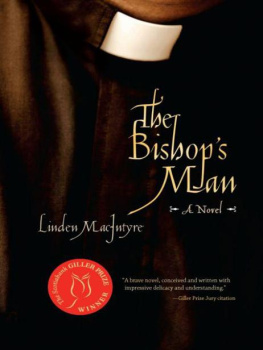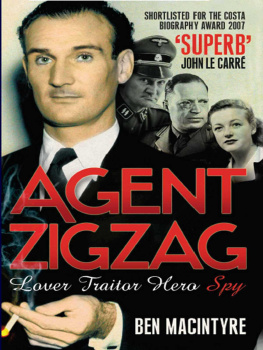Ben Macintyre - A Spy Among Friends
Here you can read online Ben Macintyre - A Spy Among Friends full text of the book (entire story) in english for free. Download pdf and epub, get meaning, cover and reviews about this ebook. year: 2014, publisher: Bloomsbury Publishing, genre: History. Description of the work, (preface) as well as reviews are available. Best literature library LitArk.com created for fans of good reading and offers a wide selection of genres:
Romance novel
Science fiction
Adventure
Detective
Science
History
Home and family
Prose
Art
Politics
Computer
Non-fiction
Religion
Business
Children
Humor
Choose a favorite category and find really read worthwhile books. Enjoy immersion in the world of imagination, feel the emotions of the characters or learn something new for yourself, make an fascinating discovery.

- Book:A Spy Among Friends
- Author:
- Publisher:Bloomsbury Publishing
- Genre:
- Year:2014
- ISBN:9781408851746
- Rating:5 / 5
- Favourites:Add to favourites
- Your mark:
- 100
- 1
- 2
- 3
- 4
- 5
A Spy Among Friends: summary, description and annotation
We offer to read an annotation, description, summary or preface (depends on what the author of the book "A Spy Among Friends" wrote himself). If you haven't found the necessary information about the book — write in the comments, we will try to find it.
A Spy Among Friends — read online for free the complete book (whole text) full work
Below is the text of the book, divided by pages. System saving the place of the last page read, allows you to conveniently read the book "A Spy Among Friends" online for free, without having to search again every time where you left off. Put a bookmark, and you can go to the page where you finished reading at any time.
Font size:
Interval:
Bookmark:

In memory of Rick Beeston
The Friends n. General slang for members of an intelligence service; specifically British slang for members of the Secret Intelligence Service, or MI6.
If I had to choose between betraying my country and betraying my friends, I hope I should have the guts to betray my country. Such a choice may scandalise the modern reader, and he may stretch out his patriotic hand to the telephone at once and ring up the police. It would not have shocked Dante, though. Dante places Brutus and Cassius in the lowest circle of Hell because they had chosen to betray their friend Julius Caesar rather than their country Rome.
E. M. Forster, 1938
Contents
Preface
Introduction
1 Apprentice Spy
2 Section V
3 Otto and Sonny
4 Boo, Boo, Baby, Im a Spy
5 Three Young Spies
6 The German Defector
7 The Soviet Defector
8 Rising Stars
9 Stormy Seas
10 Homers Odyssey
11 Peach
12 The Robber Barons
13 The Third Man
14 Our Man in Beirut
15 The Fox who Came to Stay
16 A Most Promising Officer
17 I Thought it Would Be You
18 Teatime
19 The Fade
20 Three Old Spies
Afterword
Picture Section 1
Picture Section 2
Acknowledgements
Bibliography
Notes
A Note on the Author
By the Same Author
Also available by Ben Macintyre
Preface
There is a voluminous literature on Kim Philby, including the invaluable pioneering work of writers such as Patrick Seale, Phillip Knightley, Tom Bower, Anthony Cave Brown and Genrikh Borovik. But to many readers, Philby remains opaque, like the Cold War itself, often alluded to but little understood. Moreover, in recent years the release of much previously classified material, along with authorised histories of MI5 and MI6, have shed new light on both that conflict, and Philbys place within it.
This is not another biography of Kim Philby. Rather, it is an attempt to describe a particular sort of friendship that played an important role in history, told in the form of a narrative. It is less about politics, ideology and accountability than personality, character, and a very British relationship that has never been explored before. Since the MI6, CIA and KGB files remain closed, much source material is secondary: the evidence of third parties, often expressed in retrospect. Spies are particularly skilled at misremembering the past, and the protagonists in this story are all guilty, to some extent, of distorting their own histories. Many of the facts about the Philby case are still hotly disputed, and theories, conspiratorial and otherwise, abound. Some of the more contentious issues are discussed in the endnotes. Much that has been written about Philby derives from memory, or speculation, without documentary support; some is coloured by propaganda, and some is pure fantasy. Until and unless the official files are released in their entirety, a degree of mystery will always be attached to these events. For the narrative historian, this creates particular challenges. Presented with conflicting accounts, different viewpoints and divergent recollections, I have had to make judgements about the credibility of different sources, and choose which of the many strands of evidence seem to run closest to reality. Others will doubtless disagree with my choices. This is not an exact science: but what follows is as close to a true story as I can make it.
This book does not purport to be the last word on Kim Philby. Instead, it seeks to tell his story in a different way, through the prism of personal friendship, and perhaps arrive at a new understanding of the most remarkable spy of modern times.
Introduction
Beirut, January 1963
Two middle-aged spies are sitting in an apartment in the Christian Quarter, sipping tea and lying courteously to one another, as evening approaches. They are English; so English that the habit of politeness that binds them together and keeps them apart, never falters for a moment. The sounds of the street waft up through the open window, car horns and horses hooves mingling with the chink of china and the murmured voices. A microphone, cunningly concealed beneath the sofa, picks up the conversation, and passes it along a wire, through a small hole in the wainscoting and into the next room, where a third man sits hunched over a turning tape-recorder, straining to make out the words through Bakelite headphones.
The two men are old friends. They have known each other for nearly thirty years. But they are bitter foes now, combatants on opposing sides of a brutal conflict.
Kim Philby and Nicholas Elliott learned the spy trade together during the Second World War. When that war was over, they rose together through the ranks of British intelligence, sharing every secret. They belonged to the same clubs, drank in the same bars, wore the same well-tailored clothes, and married women of their own tribe. But all that time, Philby had one secret he never shared: he was covertly working for Moscow, taking everything he was told by Elliott, and passing it on to his Soviet spymasters.
Elliott has come to Beirut to extract a confession. He has wired up the apartment, and set watchers on the doors and street. He wants to know how many have died through Philbys betrayal of their friendship. He wants to know when he became a fool. He needs to know the truth, or at least some of it. And once he knows, Philby can flee to Moscow, or return to Britain, or start anew as a triple agent, or drink himself to death in a Beirut bar. It is, Elliott tells himself, all the same to him.
Philby knows the game, for he has played it brilliantly for three decades. But he does not know how much Elliott knows. Perhaps the friendship will save him, as it has saved him before. Both men tell some truth, laced with deception, and lie with the force of honest conviction. Layer upon layer, back and forth.
As night falls, the strange and lethal duel continues, between two men bonded by class, club and education but divided by ideology; two men of almost identical tastes and upbringing, but conflicting loyalties; the most intimate of enemies. To an eavesdropper, their conversation appears exquisitely genteel, an ancient English ritual played out in a foreign land; in reality it is an unsparing, bare-knuckle fight, the death throes of a bloodied friendship.
1
Apprentice Spy
One moment Nicholas Elliott was at Ascot racecourse, watching the favourite, Quashed, come romping home at 72, and the next, rather to his own surprise, he was a spy. The date was 15 June 1939, three months before the outbreak of the deadliest conflict in history. He was twenty-two.
It happened over a glass of champagne. John Nicholas Rede Elliotts father, Sir Claude Aurelius Elliott, OBE, was headmaster of Eton, Englands grandest public school, a noted mountaineer, and a central pillar of the British establishment. Sir Claude knew everybody who was anybody, and nobody who wasnt somebody, and among the many important men he knew was Sir Robert Vansittart, chief diplomatic adviser to His Majestys Government, who had close links to the Secret Intelligence Service (SIS), better known as MI6, the agency responsible for intelligence-gathering abroad. Nicholas Elliott arranged to meet Van at Ascot and, over drinks, mentioned that he thought he might like to join the intelligence service.
Sir Robert Vansittart smiled and replied: I am relieved you have asked me for something so easy.
So that, Elliott wrote, many years later, was that.
The Old Boy recruitment network had worked perfectly.
Nicholas Elliott was not obviously cut out to be a spy. His academic record was undistinguished. He knew little about the complexities of international politics, let alone the dextrous and dangerous game being played by MI6 in the run-up to war. Indeed, he knew nothing whatsoever about espionage, but he thought spying sounded exciting, and important, and exclusive. Elliott was self-confident as only a well-bred, well-heeled young Etonian, newly graduated from Cambridge, with all the right social connections, can be. He was born to rule (though he would never have expressed that belief so indelicately) and membership of the most selective club in Britain seemed like a good place to start doing so.
Next pageFont size:
Interval:
Bookmark:
Similar books «A Spy Among Friends»
Look at similar books to A Spy Among Friends. We have selected literature similar in name and meaning in the hope of providing readers with more options to find new, interesting, not yet read works.
Discussion, reviews of the book A Spy Among Friends and just readers' own opinions. Leave your comments, write what you think about the work, its meaning or the main characters. Specify what exactly you liked and what you didn't like, and why you think so.

